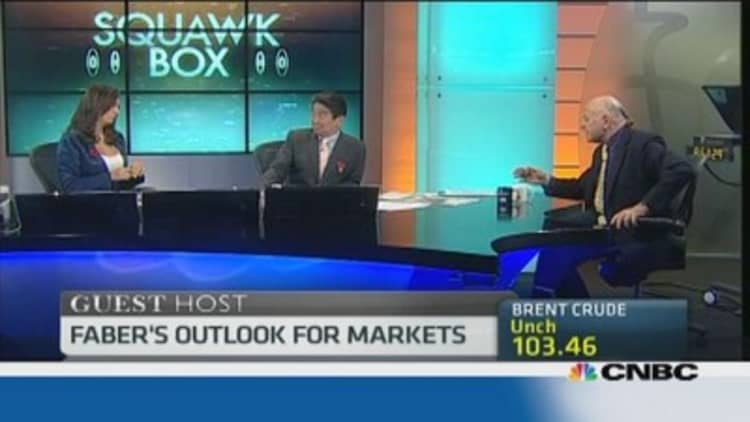
A credit boom in countries such as China means that the world is in a worse position than it was in 2008 when a global financial crisis tipped the world into recession, Marc Faber, editor and publisher of The Gloom, Boom & Doom Report, told CNBC.
"If I am telling you that we had a credit crisis in 2008 because we had too much credit in the economy, then there is that much more credit as a percent of the economy now," Faber said.
He referred to a recent report by former Bank for International Settlements chief economist William White which said that total credit in advanced economies is now 30 percent higher as a share of gross domestic product (GDP) than it was in 2007.
"So we are in a worse position than we were back then," Faber told CNBC Asia's "Squawk Box."
"Look at China, its credit as a percent of the economy has increased by 50 percent in the last 4-1/2 years. This is the fastest credit growth you can imagine in the whole of Asia," he added.
(Read more: China showing symptoms of financial crisis: report)
Economists have voiced concerns that China's rapid credit growth in recent years poses one of the biggest financial risks to the world's second biggest economy.
In recent months, there have been some signs that Chinese authorities have taken steps to contain that credit growth, tightening credit available to banks in the money markets.
(Read more: China money market rates soar to 4-month high)
Faber, well-known for his bearish views, also voiced concern about rising household debt in Asia.
"Government debt has not gone up that much but household debt has," said Faber. "In Thailand, where I spend a lot of time, we have had no recession, but we have had no growth either. It's the same in Singapore and Hong Kong."
According to Barclays, Singapore has one of the highest levels of household borrowing relative to GDP in Asia at 75 percent, up from around 63 percent in 2010 as low interest rates encouraged borrowing.
(Read more: Household debt: Singapore's Achilles heel?)
"It will end badly and the question is whether we will have a minor economic crisis and then huge money printing or get into an inflationary spiral first," Faber added.
"Why are so many product prices in Singapore and Hong Kong more expensive than in the U.S.? It's because when you have asset inflation and high property prices, shops have to pay higher rents, so they charge more for their products. So asset inflation can flow into consumer inflation," he said.
Both Singapore and Hong Kong have seen real estate prices soar in the past few years, triggering a wave of measures in both Asian financial centers to contain prices.
— By CNBC.com's Dhara Ranasinghe; Follow her on Twitter @DharaCNBC



